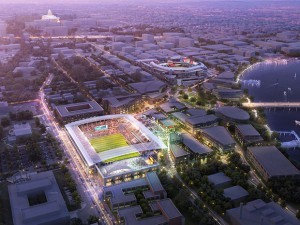Professional soccer is an important part of the quality of life in our region, and most observers agree that DC United needs a new home. And it is a fact of life that virtually all professional sports stadiums are built with some public financial support.
For the District’s Dime, then, the question is not whether the District should support a new stadium — it should — but whether the deal proposed by Mayor Gray is the best approach. Today we walk through three issues DCFPI raised at today’s DC Council hearing on the stadium: the plan to trade the Reeves Center for stadium land, the size of the city’s proposed subsidy, and the needs of the stadium’s neighbors.
- Redevelopment of the Reeves Center needs to be taken more seriously: Normally, redevelopment of a property as important as the Reeves Center would include detailed planning and a series of community meetings. Yet the mayor proposes to transfer the Reeves Center to Akridge and allow the company to redevelop the site any way it wants. In addition, the legislation would charge Akridge $56 million, despite one recent appraisal of almost $70 million. This suggests that putting the site up for sale would be better. Finally, the plan calls for creating a new Reeves Center east of the Anacostia River, yet offers no financing plans. With the city very close to its borrowing limit, it is not clear how or when a new municipal center will be completed.
- The District’s stadium subsidy should be scaled back: The deal caps the District’s investment at $150 million, yet District officials now believe buying and preparing the land will cost $120 million. This means the cap should be lowered. In addition, the legislation provides substantial property and sales tax breaks for the team, apparently to help bolster profits in the early years of the new stadium. Yet given that DC United stands to benefit financially in many ways — from ticket sales, naming rights, concessions, development near the stadium, and an increase in the team’s value — DCFPI believes that DC United should pay all sales and property taxes from day one.
In addition, the legislation offers only one provision to help meet the city’s costs, which will cover just $11 million. This means almost every dollar going into the stadium could be going to build a library or school. The Council should explore other ways to raise revenue to pay its share of stadium costs.
- The deal should support the immediate community: To make sure the stadium development is helpful and not harmful to the surrounding community, issues related to transportation, the environment, housing, and community benefits need to be worked out.
The DC Council has commissioned a study to do a cost-benefit analysis of the real estate transactions and to provide advice on the full deal. Given the complexity, this makes perfect sense.
To print a copy of today’s blog, click here.
To read DCFPI’s testimony, click here.

